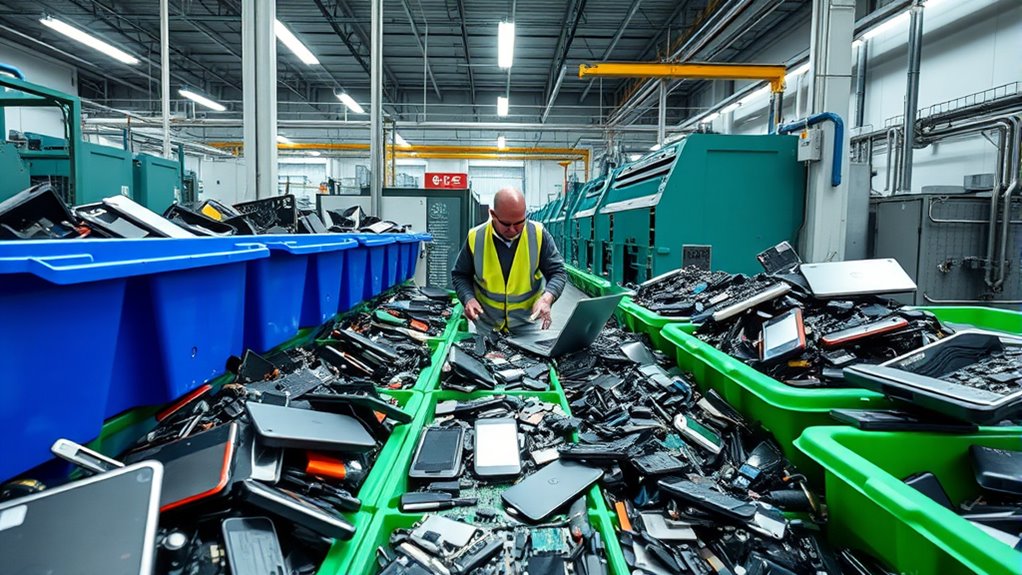To recycle electronics responsibly, you should follow local laws and choose certified disposal facilities that handle hazardous materials safely. Proper recycling helps protect the environment, conserve natural resources, and recover valuable materials like gold and rare earth elements. It also prevents illegal dumping and environmental contamination. By understanding these practices, you can make smarter recycling choices and support sustainable habits. Keep exploring to discover more ways to make your e-waste management environmentally friendly.
Key Takeaways
- Follow local e-waste legislation to ensure environmentally sound disposal and prevent illegal dumping.
- Use certified recycling facilities that handle hazardous materials safely and comply with regulations.
- Prioritize donation or refurbishment of electronics to extend their lifecycle and support the circular economy.
- Educate consumers and manufacturers about responsible e-waste management and the importance of recycling properly.
- Recover valuable materials like metals and rare earth elements responsibly to promote sustainability and environmental protection.

Recycling electronics responsibly is essential to protecting the environment and reducing harmful waste. When you dispose of your old devices properly, you’re not only preventing pollution but also helping conserve natural resources. One way to guarantee you’re making an impact is by understanding the role of e waste legislation. These laws set clear guidelines for how electronic waste should be managed, ensuring that manufacturers, recyclers, and consumers all follow safe and environmentally friendly practices. E waste legislation aims to reduce illegal dumping, promote recycling, and ensure that hazardous materials are handled responsibly. By staying informed about your local regulations, you can make smarter choices about where and how to recycle your electronics.
Handling hazardous materials is a critical part of responsible electronic waste disposal. Many electronic devices contain dangerous substances like lead, mercury, cadmium, and brominated flame retardants. If these materials aren’t managed properly, they can leach into the soil and water, posing serious health risks to humans and wildlife. When you recycle electronics through certified facilities, you help guarantee these hazardous materials are managed safely. Certified recyclers follow strict protocols for hazardous material handling, minimizing the risk of contamination. This involves secure dismantling processes, specialized equipment, and adherence to safety standards. By choosing reputable recycling centers, you’re actively participating in proper hazardous material handling, which reduces environmental harm and protects public health.
Your role extends beyond just dropping off your devices at a recycling center. Educating yourself about the importance of responsible e waste management encourages others to do the same. When you advocate for compliance with e waste legislation, you’re supporting policies that promote environmentally sound recycling practices. This helps create a safer environment for everyone and ensures that valuable materials like gold, silver, and rare earth elements are recovered and reused rather than wasted. Additionally, understanding the importance of hazardous material handling pushes you to seek out certified recyclers who follow proper procedures, rather than risking illegal dumping or informal recycling that could lead to pollution.
Taking responsibility for your electronic waste also means being proactive about the lifecycle of your devices. Before replacing or discarding electronics, consider options like donation or refurbishment, which extend their usefulness and reduce waste. When it’s time to recycle, ensure you bring your devices to authorized facilities that comply with e waste legislation and prioritize hazardous material handling. Doing so not only helps the environment but also supports a circular economy, where valuable resources are kept in use longer. Moreover, understanding how currency fluctuations can impact the cost of recycling and electronics procurement can help you make more informed decisions about managing your electronic assets. Ultimately, your mindful approach to electronics recycling contributes profoundly to a cleaner, safer planet for current and future generations.

Easy Pak Electronics Recycling Container
Holds electronic waste and LEDs. Electronic waste includes any electronic components that power on and have any chip…
As an affiliate, we earn on qualifying purchases.
As an affiliate, we earn on qualifying purchases.
Frequently Asked Questions
How Can I Identify Electronics That Contain Hazardous Materials?
To identify electronics with hazardous materials, look for hazardous material indicators like warning labels or symbols on the device or packaging. Check electronic component labels for details on materials used, such as lead, mercury, or cadmium. If you see labels warning about toxic substances or if the device contains parts with unusual colors or odors, it’s best to handle it carefully and research further before disposal.
What Are the Environmental Impacts of Improper E-Waste Disposal?
When you improperly dispose of e-waste, you’re risking environmental harm like habitat destruction and increasing extinction risk for wildlife. Toxic substances from electronics, such as lead and mercury, seep into soil and water, contaminating ecosystems. This not only endangers animals but also pollutes resources humans rely on. By understanding these impacts, you can see why responsible disposal helps preserve habitats, protect biodiversity, and reduce long-term environmental damage.
Are There Specific Certifications to Look for in Responsible Recyclers?
When choosing a responsible recycler, you want to look for certification standards and recycling credentials that guarantee proper handling. Certifications like R2, e-Stewards, and WEEELABEX ensure the facility meets strict environmental, health, and data security standards. These credentials validate that your electronics are recycled responsibly, safely, and ethically. By prioritizing certified recyclers, you protect the environment, support sustainable practices, and guarantee your e-waste is managed with integrity and accountability.
How Does Recycling Electronics Protect Personal Data?
Recycling electronics helps protect your personal data by guaranteeing proper data security and privacy protection measures are in place. When you recycle responsibly, certified recyclers securely erase or destroy sensitive information stored on devices, preventing data breaches. This process minimizes the risk of your private information falling into the wrong hands. By choosing reputable recyclers, you ensure your data remains confidential, giving you peace of mind and safeguarding your privacy.
Can Small Electronics Like Chargers Be Recycled Easily?
Ever wondered if small electronics like chargers are easy to recycle? The answer is yes, but it depends on the recycling methods used. You should prioritize facilities that handle battery safety because tiny devices often contain components that require special disposal. While small electronics might seem less complex, proper recycling guarantees harmful materials don’t pollute the environment. Always check local recycling programs to find the best way to responsibly dispose of chargers and similar items.

Brady SPC SKH-PP Hazwik Chemical Portable Spill Kit – includes disposal bag, instructions, gloves, pads (10) , and socks (2)
Contents include are pads, socs, nitrile gloves, disposal bag
As an affiliate, we earn on qualifying purchases.
As an affiliate, we earn on qualifying purchases.
Conclusion
By recycling your electronics responsibly, you’re not just decluttering; you’re saving the planet from destruction on a scale that’s almost too big to imagine. Every device you recycle keeps hazardous materials out of our soil and water, protecting future generations from catastrophic harm. Remember, your small act of responsible disposal can spark a global movement, proving that even one person’s effort can shift the course of history. Take action today—our planet’s future depends on it.
electronic device donation and refurbishment services
As an affiliate, we earn on qualifying purchases.
As an affiliate, we earn on qualifying purchases.

Easy Pak Electronics Recycling Container
Holds electronic waste and LEDs. Electronic waste includes any electronic components that power on and have any chip…
As an affiliate, we earn on qualifying purchases.
As an affiliate, we earn on qualifying purchases.









